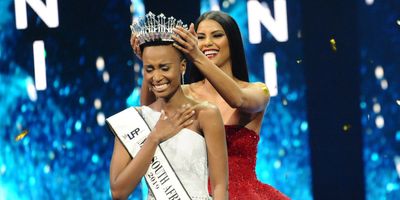South Africa's New Miss SA Has Renewed Conversation Around the Politics of Black Hair
The beauty pageant winner is the first to be crowned while rocking her natural hair in the contest's 60-year history.
The Miss SA contest is perhaps one of the biggest and most highly anticipated annual beauty pageants in South Africa. In its six-decade run, the pageant has evolved considerably. From Jacqui Mofokeng, the first Black woman ever to clinch the coveted title back in 1993 to Sibabalwe Gcilitshana, the first openly queer contestant in the 2019 edition of the contest, the pageant has certainly made strides.
This year's winner, Zozibini Tunzi, becomes the first Black woman to be crowned while rocking her natural hair. While this may not seem like such a big deal, the debates that have been sparked on South African social media show the need to continue the conversation around the politics of Black hair, especially in a country such as South Africa.
"Here sits the crown, beautifully so on my kinky coarse hair. I hope I make South Africa proud." These are the words that Tunzi wrote in a post on Instagram after winning this year's Miss SA title last week Friday.
Many South Africans, celebrities included, have since expressed their delight with the crowning of a Black woman wearing her hair in its naturally kinky state. One would think that in 2019, Black hair in its natural state wouldn't be so exceptionalized and yet it is. Three years ago, students from Pretoria Girls' High School protested the racist policies the school had with regards to Black hair. As a result, many South African women, young and old, spoke out about their own personal encounters with similar policies during their schooling days.
While the conversation on social media has also quickly highlighted that Tunzi was not crowned 2019's Miss SA simply because she chose to rock her natural hair, what is important to note is how natural Black hair is still not as accepted in the mainstream as its silky and straight alternatives. And in no way is this about having the tired "weaves/wigs versus natural hair" debate especially as it pertains to how "African" one is (that's silly), but rather shining the spotlight on how Black hair is still very much political and how moments like this only serve to reaffirm that.
- This Dominican Ministry of Education Director Was Fired Hours After ... ›
- This Black Hairstyle Collective Is Embracing the Beauty of Natural ... ›
- 8 of the Best Hair Braiding Salons in NYC - OkayAfrica ›
- Reclaiming Tradition: How Hair Beads Connect Us to Our History ... ›
- The Hidden World Of Harlem's African Braiders - OkayAfrica ›
- Zozibini Tunzi Slams Racist Hair Advert - OkayAfrica ›
- Newly Crowned Miss South Africa Shudufhadzo Musida is South Africa's Reigning Bold Beauty - OkayAfrica ›
- Miss South Africa Is Going To Israel And People Are Mad - OkayAfrica ›
- Miss South Africa Is Going To Israel And People Are Mad - OkayAfrica ›
- Malawian High Court Rules Dreadlocks Permitted in Schools - OkayAfrica ›
- Citizens & Political Parties React to South Africa’s Parliament Impeaching a Top Judge - Okayplayer ›
